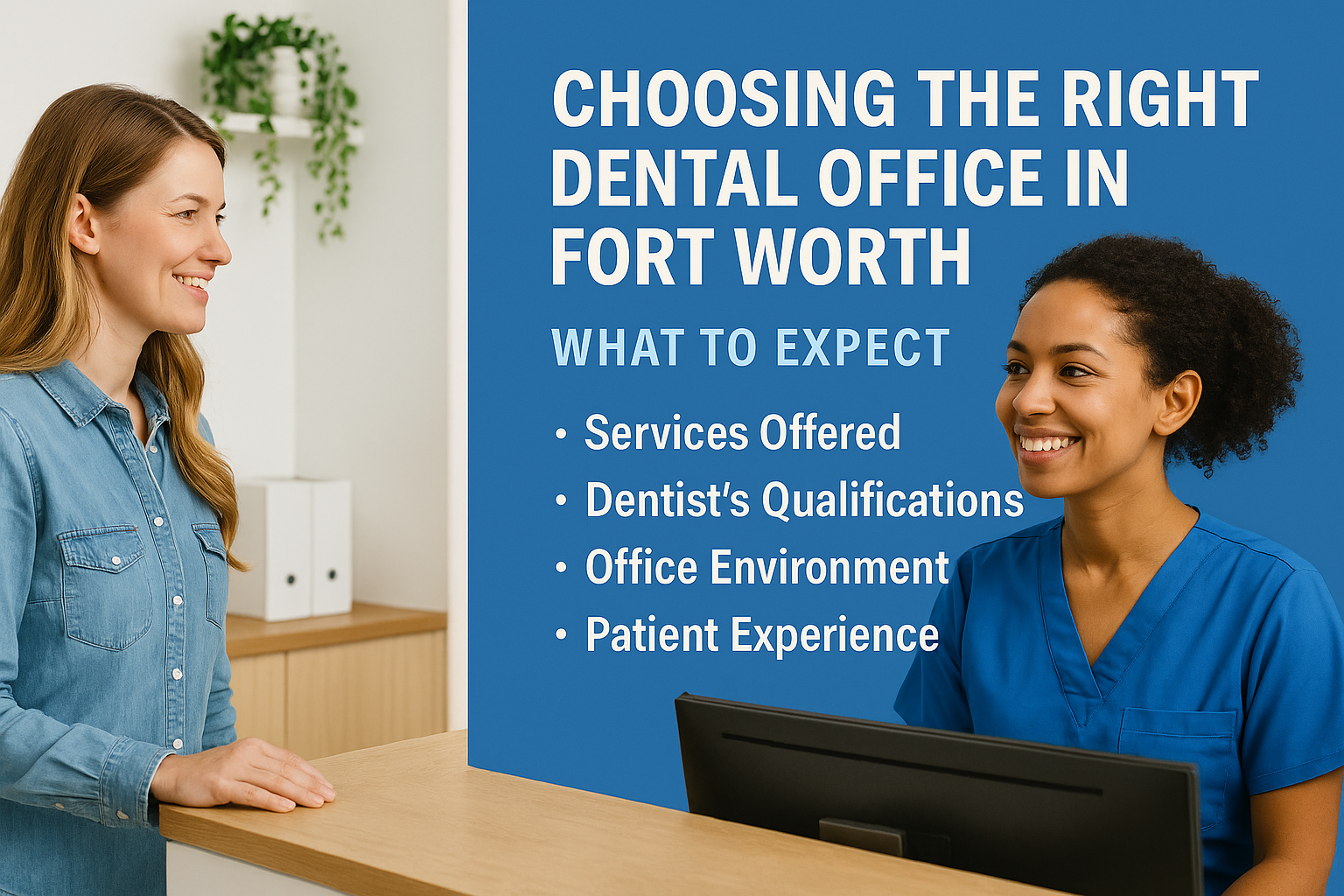Choosing the Right Dental Office in Fort Worth: What to Expect
Finding a dental office in Fort Worth isn’t difficult—there are plenty of options. But choosing the right one for you and your family takes more than a quick Google search. The best dental office should combine convenience with comprehensive care, modern technology, and a compassionate team. Here’s what to expect from your first visit, what services a great practice should offer, and why Bentley Dental has become a trusted choice in the community.
What to Expect at Your First Dental Visit
When you walk into a professional dental office, your first experience sets the tone. At Bentley Dental, new patients can expect:
- Warm welcome & check-in: We review your medical history and discuss concerns.
- Comprehensive exam: Includes X-rays, gum health evaluation, and cavity check.
- Professional cleaning: Removes plaque, tartar, and surface stains.
- Treatment planning: We explain options clearly and provide cost estimates upfront.
Essential Services Every Dental Office Should Offer
A quality dental office in Fort Worth should cover both preventive and advanced care. At Bentley Dental, we provide:
Family Dentistry
Exams, cleanings, fluoride, and sealants for children and adults.
Dental Implants
Permanent tooth replacement for missing teeth.
Teeth Whitening
One-day whitening treatments for a brighter smile.
Crowns & Bridges
Custom restorations to protect damaged teeth or replace missing ones.
Dentures & Partials
Affordable, natural-looking replacements for multiple missing teeth.
Cosmetic Dentistry
Veneers, bonding, and smile makeovers for a confident appearance.
Brighter starts now—and we’ll help you do it right.
At Bentley Dental, we offer both in-office and take-home whitening kits with stronger, safer ingredients than what you’ll find on store shelves.
Why Location Matters—But Quality Matters More
Many people search “dental office near me” because convenience is important. But don’t choose a practice based on location alone. A short drive is worth it if it means:
- A dentist who listens to your concerns
- Services that prevent referrals all over town
- A modern office with advanced technology
- A long-term relationship built on trust
Advanced Technology in Modern Dental Offices
A great dental office in Fort Worth should invest in technology that improves your care:
- Digital X-rays: Lower radiation, clearer images
- 3D Imaging: Precision planning for implants and complex cases
- Intraoral Cameras: Real-time education so you can see what we see
Why Bentley Dental Stands Out in Fort Worth
Patients choose Bentley Dental because we combine:
- Comprehensive services for preventive, restorative, and cosmetic care
- Convenient scheduling for families and professionals
- Patient-first approach with clear explanations and comfort-first treatment
- Local trust built on years of serving Fort Worth
FAQ
Look for verified licensure, a full range of services, clear fees/estimates, modern imaging (digital X‑rays, 3D when needed), convenient hours, and a team that communicates well. You can verify any Texas dentist’s license with the state board.
A new‑patient visit typically includes a health history review, needed X‑rays, a gum‑health check, a professional cleaning, and a dentist’s exam with a personalized treatment plan. Expect 30–60 minutes in many cases.
Only if your dentist determines they’re necessary. The ADA recommends taking X‑rays based on your individual risk and clinical findings, not on a fixed schedule.
Dental X‑rays use very low radiation; when they’re needed, they’re considered safe, including during pregnancy, and are taken using the “as low as reasonably achievable” (ALARA) principle. The ADA no longer recommends routine use of lead aprons/thyroid collars; state rules may vary.
Most routine cleanings take about 30–60 minutes. You may hear scraping or feel pressure; discomfort is usually minimal and manageable. Deep cleanings (for gum disease) are different and often done with numbing.
A thorough review of teeth, gums, bite, and oral tissues; X‑rays as indicated; and a discussion of findings, options, and costs. Your dentist uses this to create a personalized prevention or treatment plan.
Use the Texas State Board of Dental Examiners public license search to confirm active status and any board actions.
Common options include nitrous oxide, oral conscious sedation, and IV sedation—selected based on your health, procedure, and preference. When used appropriately, these are safe and effective.
Whitening can safely brighten natural teeth under a dentist’s guidance. Results vary and may not change the color of fillings or crowns. Options include in‑office, custom trays, and OTC products using peroxide gels.
No—cosmetic dentistry isn’t a formal dental specialty. Many general dentists offer cosmetic services such as veneers, whitening, bonding, and clear aligners.
Crowns restore or protect teeth with large decay, cracks, or after root canals; they also attach bridges or cover implants. Average lifespan is about 5–15 years depending on material and care.
A regular cleaning removes plaque and tartar above the gumline. A deep cleaning (scaling and root planing) treats gum disease by cleaning below the gums and smoothing root surfaces—usually with local anesthesia.
Full dentures typically last 7–10 years; clean daily with a non‑abrasive cleanser and soak as directed. Don’t use toothpaste on dentures, and clean your gums/tongue, too.
CBCT provides 3D views of teeth, jaws, and vital structures to help plan complex care (e.g., implants, impacted teeth, endodontics). Dentists order it only when the benefits outweigh the higher radiation vs. standard X‑rays.
It’s a tiny camera that captures close‑up color photos of your teeth and gums so you can see what we see and follow along with your treatment plan. It complements (but doesn’t replace) X‑rays.
Coverage varies by plan, but purely cosmetic procedures (like whitening) are rarely covered. Your plan documents determine benefits; we’ll provide written estimates before treatment.
Most people benefit from visits every six months, but your interval depends on your risk for cavities or gum disease. Your dentist will tailor the schedule for you.
Ask about credentials/licensure, services offered, emergency care, technology, fees/estimates, insurance coordination, and financing. A quick meet‑and‑greet helps you confirm fit and comfort.

